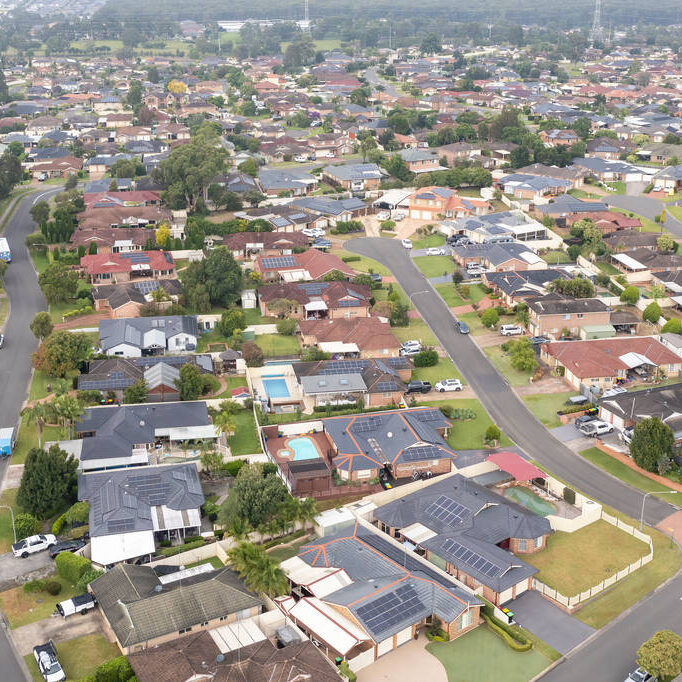You may be chasing more affordable prices, dreaming of a lifestyle change, or spotting investment potential in a different market altogether. No matter the reason, buying property in another state can be pretty tempting. But let’s be clear: buying interstate isn’t quite the same as finding a place down the road. You may have to […]
A Guide to Financing Your Home Renovations
Are you dreaming of a sleek new kitchen, a beautiful outdoor deck, a luxurious bathroom, or perhaps an extra bedroom for your growing family? Home renovations can transform your living space and increase your property’s value. But let’s face it— renovations can be costly. The good news? There are several ways to finance your home improvement projects without breaking the bank. In this guide, we’ll explore your options, from renovation loan to refinancing, and help you fund your project.
Different Options to Finance Your Home Renovation
1. Home Loan Redraw
If you’ve made extra repayments on your home loan and it has a redraw facility, you may redraw these funds to finance your renovation. You can access these funds at your home loan’s interest rate, typically lower than personal loan or credit card rates. However, be disciplined about repaying the redrawn amount to avoid extending your home loan term.
Things to keep in mind:
- Check if your loan has a redraw facility—not all loans offer this feature.
- Understand any redraw fees or limits. Some lenders charge per withdrawal or have a minimum redraw amount.
- Redraw facilities are typically only available on variable-rate home loans.
- As mentioned, you’re essentially reborrowing money you’ve already paid off, so failure to repay them could extend your loan term.
2. Refinancing Your Home Loan
Refinancing involves replacing your current mortgage with a new one, potentially at a lower interest rate or with a cash-out refinancing option to fund your renovations. It can be particularly beneficial if you can secure a significantly lower interest rate or if your home value has appreciated, allowing you to access more equity & turn it into cash. It’s worth getting a professional valuation to understand your current equity position.
Things to keep in mind:
- You may access better interest rates, especially if rates have dropped since you took out your original loan.
- Consider the costs of refinancing (e.g., application fees, valuation fees, potential break costs for fixed loans) to see whether it’s the best option.
- Ensure the long-term benefits outweigh the short-term costs.
- You might extend your loan term to reduce monthly repayments, but this could result in paying more interest over time.
3. Home Equity Loan
This involves borrowing against the equity you’ve built up in your home. Equity is the difference between your home’s current value and your outstanding mortgage. Home equity loans are suitable for buying another property or funding major renovations, like home extensions, kitchen remodels or second-storey additions, as they often offer larger loan amounts at competitive rates. But be cautious about over-leveraging your home, especially if the current property values are volatile.
Things to keep in mind:
- Your home’s value and outstanding mortgage determine how much you can borrow. Learn to calculate your usable equity before applying for home equity loans.
- Interest rates for home equity loans are typically lower than personal loans or credit cards.
- Your home serves as security, so there’s a risk if you can’t make repayments.
- Some lenders offer a Home Equity Line of Credit (HELOC), providing more flexibility in how you access funds. With HELOC, you’re approved for a certain amount based on your usable home equity and draw (and pay interest on) only what you need. It can be beneficial if you aren’t sure exactly how much you’ll need for your home renovation projects.
4. Construction Loan
Knocking down a wall, raising a roof or adding a granny flat? Consider construction loans. They are ideal for large-scale renovations or rebuilds and offer the benefit of only paying interest on the funds you’ve used, which can save money during the renovation process. However, be prepared for a more complex application and approval process. Also, note that funds are released through progress payments.
Things to keep in mind:
- Construction loans may come with a higher interest rate than standard mortgages.
- These require detailed plans and costings before approval.
- Lenders will typically conduct inspections at each stage before releasing funds.
- You only pay interest on the amount drawn down, not the full loan amount.
5. Personal Loan
Personal loans can be a good option for smaller renovation projects or if you don’t have much equity in your home to borrow against or leverage. They offer the advantage of fixed repayments, making budgeting easier. However, spend ample time looking for competitive rates; these can vary significantly between lenders.
Things to keep in mind:
- When unsecured, personal loans generally have higher interest rates than secured loans like home loans.
- They have shorter loan terms than home loans, typically 1-7 years.
- There’s no need to use your home as security if you pick unsecured loans.
- Personal loans come with a quicker approval process than home loans.
6. Home Renovation Loan
Home renovation loans can be a great middle ground between personal and construction loans. They’re specifically designed for renovations, so lenders may offer more favourable terms to accommodate your project needs. Like personal loans, home renovation loans can be secured or unsecured. The main difference between these options is the presence of collateral or assets to secure the loan.
Things to keep in mind:
- A house renovation loan often offers more competitive rates than standard personal loans.
- Home renovation loans may have higher borrowing limits than personal loans.
- Some lenders may require quotes or plans for the renovation.
- Home renovation financing can be secured (using your home or any other existing property as collateral) or unsecured.
- These loans typically offer more flexibility than a construction loan.

How to Choose the Best Renovation Financing Option
- Assess the scale of your renovation project.
Small projects might be suited to a personal loan or redraw, while major renovations might require refinancing or a construction loan.
- Consider your current home loan.
If you’re happy with your current lender and have a redraw facility, using the redraw could be the simplest option. If not, refinancing might offer better overall benefits.
- Calculate your usable equity.
A home equity loan or cash-out refinance could offer the best rates and largest loan amounts if you’ve built up significant equity in your home.
- Think long-term.
Will the renovation add so much value to your home? This could justify a larger home renovation loan or refinancing. Consider getting a professional valuation to understand the potential return on investment.
- Calculate the costs.
Don’t just look at interest rates. Consider fees, charges, and the total cost over the life of the loan. Use comparison rates to get a more accurate picture of the total cost.
- Check your credit score.
Your credit score can affect your eligibility and interest rates for personal loans and refinancing. If your score has improved since your original home loan, you might qualify for better rates.
- Consider your income stability.
Ensure you can comfortably meet repayments, especially if you’re potentially extending your loan term or borrowing additional funds.
- Evaluate tax implications.
Do you plan to renovate a holiday house you rent out regularly or any other investment property? Consult a tax professional about potential deductions. If you’re an owner-occupier planning energy-efficient renovations, check if these household energy upgrades might qualify for government rebates.
How Deltos Finance Can Help
At Deltos Finance, we understand that every homeowner’s situation is unique. Our expert mortgage brokers in Hobart, Carlton, Launceston & the rest of Tasmania can:
- Assess your current financial situation and renovation goals.
- Compare a wide range of lenders and products to find the best fit.
- Guide you through the application process, whether you’re refinancing or applying for a new loan.
- Provide ongoing support and advice throughout your renovation journey.
Over the years, we have built strong relationships with over 40 lenders that can offer competitive refinancing options, construction loans, and more. Let us help you kickstart your house renovation project while ensuring your financial well-being.
Contact Deltos Finance today for expert guidance and support!
FAQs About Renovation Financing
How much can I borrow for renovations?
It depends. You have to consider multiple factors, including your equity, income, credit score, and the expected value of your home post-renovation. For home equity loans or cash-out refinancing, you can typically borrow up to 80-85% of your home’s value minus your current mortgage balance. If you’re applying for personal or home renovation loans, amounts can range from $5,000 to $100,000, depending on your financial situation. Speak to a mortgage broker for a tailored assessment.
Should I use a credit card for small renovation expenses?
While convenient, credit cards often have high interest rates. They might be suitable for minor projects or small expenses you can pay off quickly, especially if you can take advantage of interest-free periods or rewards points. However, for larger expenses, consider a personal loan or redraw facility for better rates. No matter the renovation financing option, have a clear repayment plan to avoid piling debts.
Can I get a renovation loan if I have bad credit?
It may be more challenging, but options are available. If you have significant equity in your home, you might still qualify for a home equity loan or refinance your mortgage with bad credit. Secured personal loans or guarantor loans might also be alternative options. A mortgage broker can help you explore alternatives and improve your application. If possible, improve your credit score before applying.
How long does it take to get approved for renovation financing?
Approval times vary depending on the type of financing and lender. Personal loans can be approved in as little as 24 hours, while home equity loans or refinancing typically take 2-4 weeks. Construction loans may take longer due to the need for detailed plans and costings. To speed up the process, have all your documentation ready, including proof of income, bank statements, and renovation quotes or plans.
Enquire Now
Find Your Perfect Finance Solution
Let's discuss your finance needs. We’re here to help.
More posts from Deltos Finance

Suburbs with the Highest Rental Yield in Tasmania
The term “rental yield” is music to any property investor’s ears. It’s the key metric that indicates the annual return on your investment, essentially the percentage of the property’s value that comes back to you in rental income. In a market like Tasmania, which has been gaining traction for its overall investment appeal, pinpointing the […]

Launceston: A ‘Second Wind’ Property Market You Should Invest in Now
When talk turns to Tasmania’s property scene, it’s easy for the spotlight to shine brightly on Hobart, with its bustling waterfront and historic charm. But just a little further north, nestled at the head of the picturesque Tamar Valley, lies Launceston—a city that quietly hits its stride and presents a compelling proposition for savvy property […]

How Often Does Property Double in Value?
Every homeowner has likely dreamed of their property doubling in value in the future, turning into a valuable nest egg or funding their next big adventure. But how long does it actually take for a property to double in value? And how often does it happen? While there’s no magic eight-ball to predict the property […]

Stamp Duty Exemption for First-Home Buyers in Tasmania: Has It Paid Off?
Purchasing a property has historically come with major financial difficulties, especially for first-home buyers in Tasmania or any other state for that matter. The stamp duty is one of those most notable monetary challenges for homebuyers. Essentially, it’s a tax levied on property purchases that often adds tens of thousands of dollars to upfront costs. […]

Difference Between Airbnb and Traditional Renting in Hobart
Hobart’s property market has become a hotspot for investors largely because of its strong tourism demand and stable rental market. But that doesn’t mean all property investments in this Tasmania capital are a sure win. One factor to consider is deciding between short-term rentals like Airbnb and traditional long-term renting. Each option has distinct advantages […]

Is Launceston a Good Place to Live?
The short answer is yes, especially if you want a more affordable lifestyle without giving up access to key services, natural beauty, and long-term opportunities. Also, with its blend of heritage charm, steady economic growth, and a property market still within reach for many Australians, Launceston, Tasmania, is gaining momentum as a popular area for […]

Hobart Property Management Fees: A Complete Guide
You’ve already secured an investment loan and finalised your rental property purchase in Hobart. Now, it’s time to take action by listing the property for rent and managing it effectively to start generating rental income. But how much should you expect to spend on property management in Hobart, Tasmania? As Tasmania’s capital continues to attract […]

How Rising Property Prices Affect Your Home Loan and Buying Potential
Here’s the good news: the Australian real estate market has been experiencing significant growth in recent years, with house prices in major cities reaching record highs. It can be a huge win for homeowners and investors, especially those planning to sell their properties soon. However, this can be an issue for potential property buyers, including […]

Build Your Wealth with a Simple Guide to Using Your Home Equity
Building wealth requires adopting the right mindset and being strategic when using available financial instruments. Essentially, it’s about making your money work in your favour. But what if you don’t have enough cash to start creating wealth? There’s an underutilised strategy that we want to share with you, and that is leveraging your home’s equity—the […]


